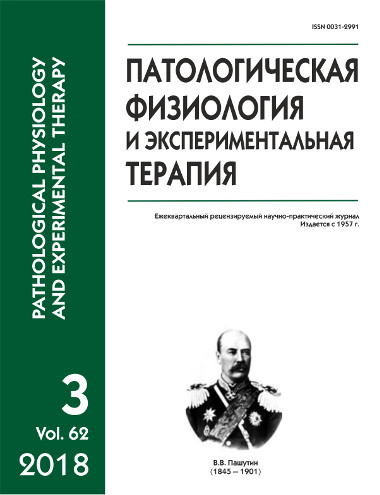Новые подходы к лечению анемии хронических заболеваний
DOI:
https://doi.org/10.25557/0031-2991.2018.03.106-112Ключевые слова:
анемия хронических заболеваний, гепсидин, эритроферрон, GS-гепаринАннотация
Цель обзора — представление новых, патогенетически обоснованных подходов к лечению анемии хронических заболеваний. Анемия хронических заболеваний часто сопутствует многим хроническим инфекциям (инфекционный эндокардит, остеомиелит, туберкулез), злокачественным новообразованиям, ревматическим болезням (ревматоидный артрит, системная красная волчанка, васкулиты), хронической почечной недостаточности. Генез такой анемии довольно сложен, многообразен и недостаточно изучен. Гепсидин является важнейшим пептидом, регулирующим всасывание железа в кишечнике. Множество восходящих и нисходящих сигнальных путей контролируют эксперссию гепсидина. Генетический дефект в одном из них может привести к дефициту, избытку или перераспределению железа в организме. Своевременное выявление и коррекция анемического синдрома могут улучшить качество жизни и выживаемость таких пациентов. Современные способы коррекции анемии хронических заболеваний, как правило, ограничиваются бесконтрольным применением препаратов железа. У больных с хронической почечной недостаточностью чаще всего используют рекомбинантный эритропоэтин, объясняя тактику лечения угнетением провоспалительными цитокинами синтеза эритропоэтина. В настоящее время разрабатывается ряд препаратов, непосредственно подавляющих синтез гепсидина или опосредованно регулирующих экспрессию стимуляторов и ингибиторов гепсидина. Некоторые лекарственные средства уже утверждены для клинического применения и могут успешно применяться для лечения железоперераспределительных анемий.Загрузки
Опубликован
2018-10-05
Выпуск
Раздел
Обзоры
Как цитировать
[1]
2018. Новые подходы к лечению анемии хронических заболеваний. Патологическая физиология и экспериментальная терапия. 62, 3 (Oct. 2018), 106–112. DOI:https://doi.org/10.25557/0031-2991.2018.03.106-112.













